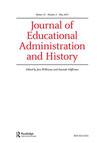Towards an understanding of curricular justice and democratic schooling
IF 1.8
Q2 EDUCATION & EDUCATIONAL RESEARCH
Journal of Educational Administration and History
Pub Date : 2021-09-13
DOI:10.1080/00220620.2021.1977262
引用次数: 3
Abstract
ABSTRACT Curricular justice, achieved through a counter-hegemonic curriculum that serves the needs of the least rather than most advantaged members of society, plays a central role in providing more equitable access to meaningful education for all young people. We contend that the defining features of the contemporary schooling context in many parts of the globe, including Australia, are growing inequality and increasing disparity between students who have access to educational opportunities and outcomes, and those who do not. We take Connell’s claims—made in Schools and Social Justice, published in 1993—of the centrality of social justice in schooling and consider its relevance nearly 30 years later. In particular, we argue that curricular justice must sit at the heart of schooling that fosters democratic participation and meaningful opportunities for civic participation and belonging within society.对课程公正和学校民主的认识
课程公正是通过一个反霸权的课程来实现的,它服务于社会中最弱势而不是最有利的成员的需求,在为所有年轻人提供更公平的有意义的教育机会方面发挥着核心作用。我们认为,在包括澳大利亚在内的全球许多地区,当代学校教育环境的决定性特征是,有机会获得教育机会和成果的学生与没有机会获得教育机会和成果的学生之间的不平等和差距日益扩大。我们采用康奈尔在1993年出版的《学校与社会正义》(Schools and Social Justice)一书中提出的社会正义在学校教育中的核心地位,并考虑其在近30年后的相关性。特别是,我们认为课程公正必须成为学校教育的核心,以促进民主参与和公民参与和社会归属感的有意义的机会。
本文章由计算机程序翻译,如有差异,请以英文原文为准。
求助全文
约1分钟内获得全文
求助全文
来源期刊

Journal of Educational Administration and History
EDUCATION & EDUCATIONAL RESEARCH-
CiteScore
3.80
自引率
5.60%
发文量
25
 求助内容:
求助内容: 应助结果提醒方式:
应助结果提醒方式:


